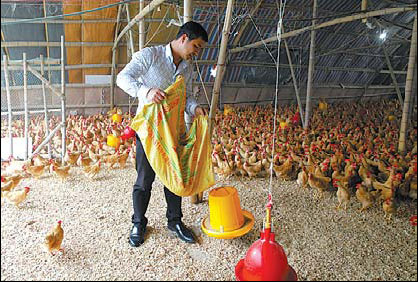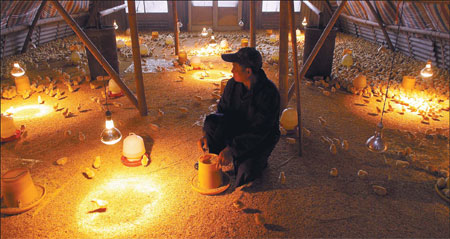Poultry industry under pressure
Updated: 2013-04-18 07:30
By Yu Ran (China Daily)
|
|||||||||||
The unexpected outbreak of the new H7N9 strain of bird flu is imposing a huge financial strain on breeders and sellers, reports Yu Ran in Wenzhou, Zhejiang.
After being woken in the early morning by his 16,000 chickens crowing in their coops, Pan Jianjing was unable to get back to sleep. Usually a sound sleeper, the 37-year-old breeder's rest has been disrupted by business concerns. The outbreak of the H7N9 strain of bird flu has resulted in the bottom falling out of the market and Pan hasn't sold a chick in the past two weeks.
Pan's 2,000-square-meter farm, in Tengqiao village, Wenzhou, Zhejiang province, an area well known for smoked chicken products, has turned from money-spinner to cash drain.
 |
|
Pan Jianjing, 37, is worried about the cost of keeping his 16,000 unsold chickens on his farm. Gao Erqiang / China Daily |
By Tuesday, the national and provincial labs had tested 47,801 samples from 84,444 collected nationwide, according to the Ministry of Agriculture. The 39 positive samples taken from live poultry all originated in the municipality of Shanghai and the provinces of Anhui, Zhejiang and Jiangsu, all of which confirmed cases of H7N9 bird flu.
So far, 77 cases have been confirmed nationwide and 16 people have died, according to Xinhua News Agency.
Rising losses
Feeding his chickens costs Pan almost 3,000 yuan ($485) a day, including about 2,000 yuan for a dozen packs of feed, which cost 150 yuan each. The rest goes on wages and electricity charges. With no money coming in, Pan's loss is expected to reach more than 100,000 yuan within the month.
"I used to make an annual net profit of 40,000 to 50,000 yuan, which covered the family's daily expenses and helped to pay for the gradual expansion of my farm. Now I'm worried that I will spend all my savings in just one or two months," said Pan, the family breadwinner and father of a 3-year-old son and a daughter, 11.
The growth cycle of a chicken lasts about 60 days, which means that most of the meat chickens, as opposed to laying chickens, have to be sold within two months, otherwise keeping them will result in a huge waste of food and money.
At present, most of his roosters are 40 days old and need to be sold within 20 days to minimize the losses, which are rising daily.
By Monday, the losses experienced by poultry-related businesses nationwide had reached more than 13 billion yuan, according to estimates provided by the National Poultry Industry Association. Unsold baby meat chicks have so far cost breeders more than 3.7 billion yuan.
"I have no option but to pray that the scandal of the H7N9 virus will be controlled as soon as possible. That would save us from a severe dilemma," said Pan.
Meanwhile, Ye Guowang, who owns a chicken farm in the same village as Pan, is wasting money every minute on feeding 10,000 chickens that are ready to be sold.
"Most of my chickens have stopped growing, but they are still eating a large amount of feed every day, which is a waste for me," said 63-year-old Ye, who has seen his business expand over three decades from a few dozen chickens to around 20,000 on his farm at any given time.
Ye added that it is common to have a few cases of bird flu in the hennery every year, especially at springtime, but the unexpected new H7N9 strain has wrought huge damage on the poultry industry.
The outbreak has brought the industry to a standstill; few consumers are willing to buy poultry-related products, which has resulted in a sharp fall in the prices of chickens and ducks and even eggs.
"The price of an ordinary meat chicken has dropped from 12 yuan a kilo to four, but still no one wants to buy, even at such a low price," said Ye, who spends around 2,600 yuan a day keeping unsold chickens on his farm.
To ensure his chickens are healthy and safe to be sold at the market, Ye has to treat them with a vaccine twice a month to prevent the various strains of bird flu and other infectious diseases.
"I will have to buy more vaccine for these chickens in around a week, if the demand for chicks stays at zero," said Ye, who usually earns a profit of around 1.5 yuan for each chicken sold.
Compared with Ye Guowang, Ye Enlin, the managing director of the Wenzhou Minxin poultry cooperative in the village is suffering much greater losses; he has signed agreements to buy 5 million chickens a year from 80 henneries in the cooperative.
Three days ago, Ye Guowang, also a member of Wenzhou Minxin poultry cooperative, put 10,000 chicks in the hot house, where the temperature is constantly maintained at between 33 C and 35 C. The chicks were sold to the cooperative as part of an agreement signed in January, so he hasn't lost any money on them yet, but that may change if the outbreak doesn't end soon.
"I signed the agreement to buy those chickens, so I am facing double the losses of farm owners," said Ye Enlin, who has lost more than 10 million yuan in sales during the past month.
Ye has slaughtered and frozen a few hundred mature roosters in the hope of selling them in two or three months, as a means of minimizing his losses.
And it's not just the breeders who are suffering; poultry sellers who've been forced to close their stands at agricultural produce markets are waiting anxiously for an end to the outbreak, but the cases keep appearing.
"I am making some money by transporting vegetables to other agricultural markets, but we're struggling to make a living at the moment," said Xia Maochun, who sells poultry at an agricultural market in Gaoling Road, Shanghai, and regularly supplies nearby restaurants and residents.
Xia faces a monthly loss of about 40,000 yuan after closing his market stall. He is currently waiting for the local government to release information about reopening stalls and markets.
Related Stories
People changing daily habits 2013-04-18 01:48
TCM helps in treating H7N9 patients 2013-04-18 00:25
H7N9 update: 83 infected, 17 dead 2013-04-17 23:26
H7N9 patients get compensation from restaurant 2013-04-17 21:37
H7N9 still confined to live poultry markets 2013-04-17 19:58
Five poultry samples test positive for virus 2013-04-17 02:08
Today's Top News
Police continue manhunt for 2nd bombing suspect
H7N9 flu transmission studied
8% growth predicted for Q2
Nuke reactor gets foreign contract
First couple on Time's list of most influential
'Green' awareness levels drop in Beijing
Palace Museum spruces up
Trading channels 'need to broaden'
Hot Topics
Lunar probe , China growth forecasts, Emission rules get tougher, China seen through 'colored lens', International board,
Editor's Picks

|

|

|

|

|

|







